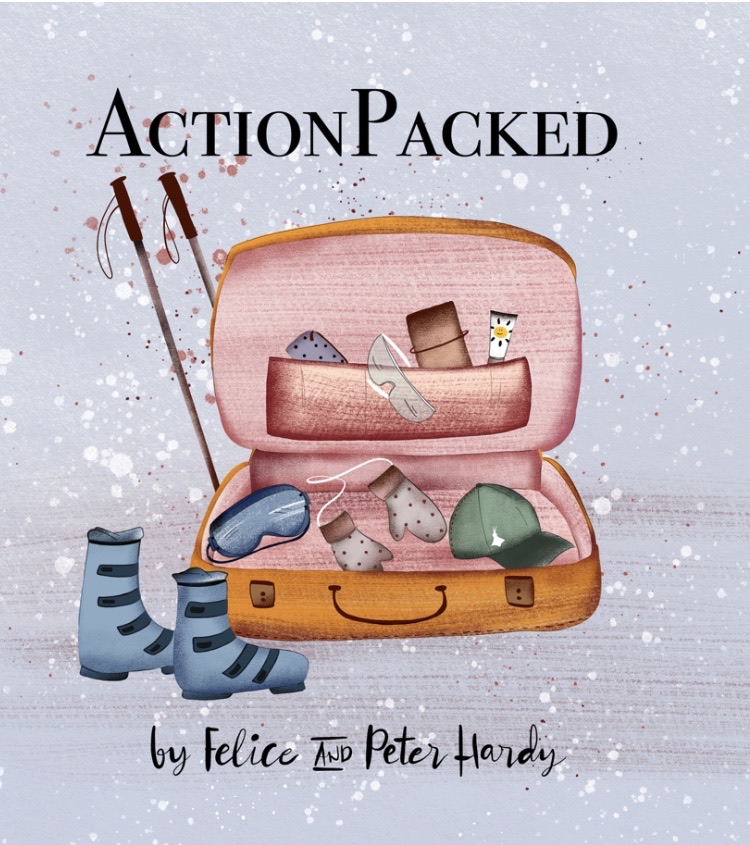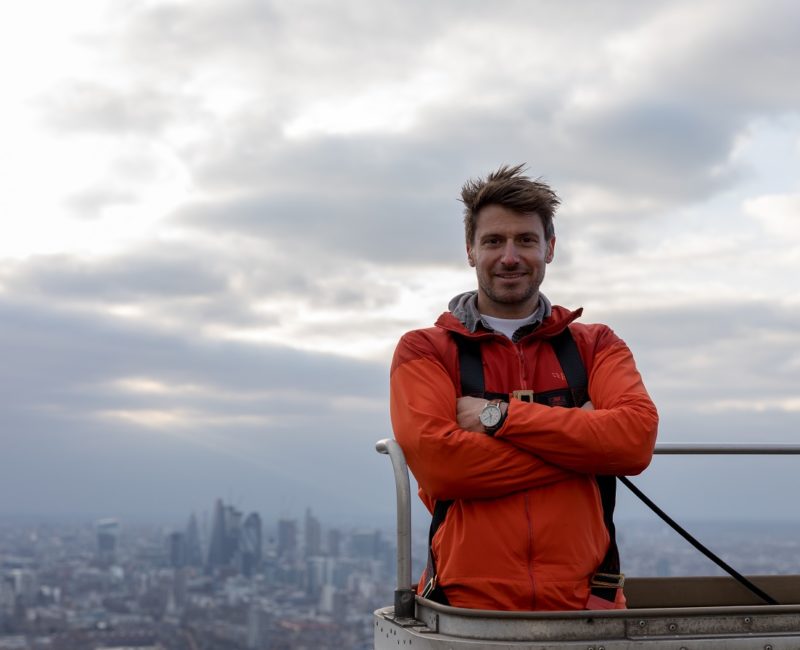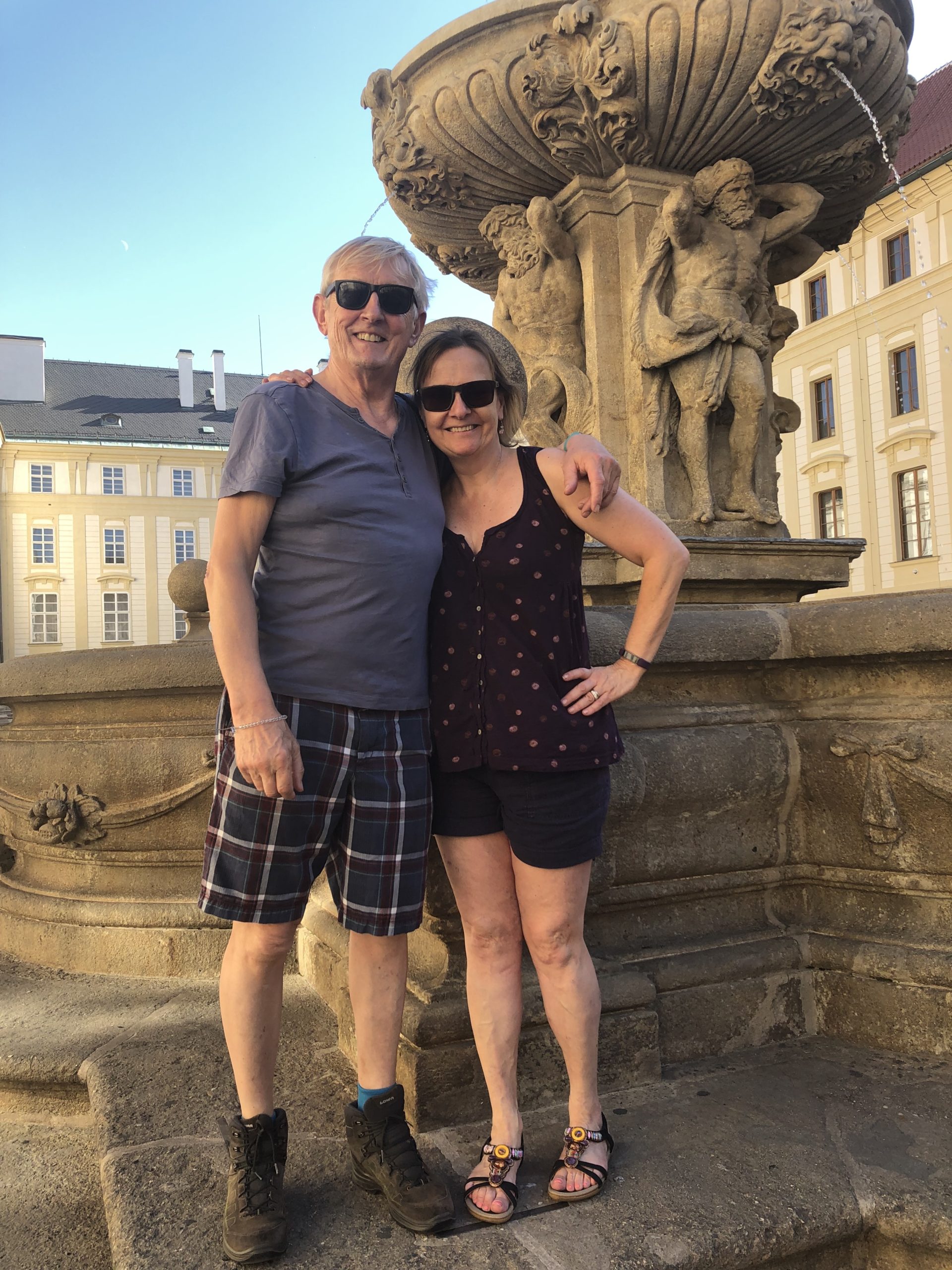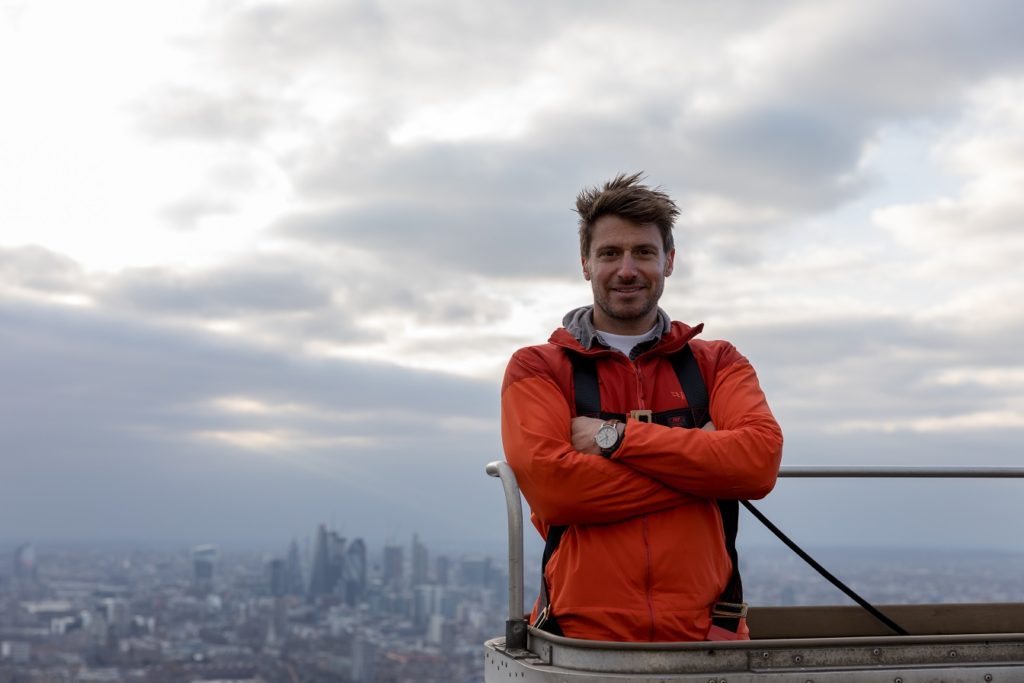
This week, we’re talking to a self-confessed British sports fanatic, Rob Bell, a keen marathon runner who, together with 5 friends, took on the ultimate endurance challenge.
Peter Rob Bell, ActionPacked is the name of our travel podcast, and they didn’t come any more action packed than you. You’re a triathlete and iron man, marathon and swim-runner, but 777 was a challenge you’ve so far set yourself – the biggest one of all – seven marathons over seven days on seven different continents. In terms of physical and mental torture, it sounds like a real world beater. So I guess the big question is why?
Rob I don’t have an excellent answer to why I do any of this stuff, I honestly don’t, and I know that because I ask myself that question a lot. Why do I feel like I need to go out and run? Why do I feel like I need to go to another race? But seven marathons was a bit different. Seven marathons came about from a group of friends talking, really, after Christmas and January when everything’s a bit slow and everyone’s not really done very much for the last few weeks – thinking about the year ahead and going, you know what…what can we do? What challenge can we set ourselves in the year ahead?
One of the guys suggested this. I think he’d read it in Sir Ranulf Fiennes‘ autobiography – he was the first to do it. And so he threw out there and there were some big smiles and some what? type thing. It didn’t take long for all of us to sort it out in our minds, like: ‘Yeah, we could do this, we should definitely go and do that.’
And so to answer the question, Peter, I think why is because it was it was a challenge that we all thought would be enjoyable to go and try and achieve, and that we felt it would be really pushing ourselves to our limits to go to and achieve. I personally get a lot out of that, knowing that I am pushing myself towards my limits and that I’m not resting on my laurels at all.
Both the achievement itself and the work that you have to put in to get to that point at the end, in fact, it’s probably more the latter. I enjoy the work that you put in a period of time, especially if you’re sharing that with like-minded people.
Felice So what did you do to prepare for it? Was it a special diet, special exercises anything like that?
Rob I’ve never done any kind of special diet for any of my exercise. I mean, it’s appalling, I’ve been a bit chubby sometimes when I’ve done some of my fastest marathons. So no diet is a great. You just go for it, eat whenever you want. That’s not any kind of professional advice, that’s advice I just give myself.
But the training was massive. I’d say it was probably six months of real dedicated training. And that was a mixture of really long, slower, plodding runs, some speed work on the tracks, some hill work for strength. But it’s something that I really added into my training regime was strength and conditioning, and I took some advice early on about that. It was really working my core, really working my glutes and working my back to have real strength. And the whole point of that was to try and avoid injuries so that you could run strong and run efficiently, and try to avoid injuries later down the line. And it made a real difference, and it was doing a little bit every day, doing some resistance band work at home every day, two or three times a day, whenever you had the time.
I just carry these little resistance bands around with me all the time. I mean, sometimes I’d end up doing it on the train if I was going somewhere. If I was waiting to meet somebody, I might just pop them out and start doing weird exercises, hold on to a lamp post – I didn’t really care. So the strength and conditioning was a big element that made a big difference.
Peter So how did you finance the whole thing? Presumably it was quite expensive – and then did you have a physio with you or someone? So how big was the group overall?
Rob There were six of us who did the challenge – that was really limited by the number of people that we could get onto the plane that we wanted to charter to Antarctica. It would have been good to have seven – seven, seven, seven – seven of us doing it, but there are only six seats on the plane to Antarctica. So there were six of us who did the run. But we teamed up with a physio who heard about what we were doing and took an interest in it early on. He was actually helping us with our strength and conditioning and some of the preparatory work in testing our lactate thresholds to help us figure out the speeds at which we should be running, or the heart rates at which we should be running to be able to keep going for the longest. That was really nice putting a bit of sport science into our training and into our running as well. I thoroughly enjoyed that.
As an engineer I love that analytical, scientific approach. Talking about it amongst the guys, we decided that wouldn’t be a bad thing to have him come along – because there were some injuries along the way and he helped us with those kind of niggles. He was also doing a bit of a research project through us as well. So for six months every day, we had to do this kind of mental test to see how sharp we were. It was on our phone…the test is fairly rudimentary, I guess, but it was a bit of a measurement of how alert we were. So we’d do that every single day, and then when we’re out racing as well, we do it. And you could see it kind of dropping off as the week went along. But he’d also before and after every race, he’d be taking different measurements on us: blood tests, saliva tests, all these kind of things to go into his research. But it was helpful for us as well.
Peter Did you have any sponsorship or did you finance it yourselves?
Rob We didn’t we didn’t take any cash for sponsorship, but we did have some sponsors who gave us some of the product, mainly a company called 1Above, who actually deal with making sure you’ve got the right nutrients inside you for when you do long-distance flights, which we were going to be doing a lot of. So it was basically this effervescent tablet that you pop into the water. And so we were on that all the time. But no, we financed the whole thing ourselves. I didn’t go on holiday very much that year.
Felice What were the seven destinations?
Rob So we started in Antarctica and we ran on a place called King George’s Island. We then did our second marathon in the very southern tip of Chile, a place called Punta Arenas, which is actually where we got the flight over to Antarctica from. So that was all logistical. That was our South American marathon. Then we went north into North America and ran a marathon in Houston, Texas. From Houston we went across the Atlantic to London, then London to Cairo for our Africa marathon, Cairo to Singapore via a very speedy stop in Dubai, which we almost missed flights on. So our Asian Marathon in Singapore, and then we finished in a very hot and steamy Sydney.
Peter So which was the easiest marathon, and which was the toughest?
Rob I’ll answer your second question first. The toughest was Sydney, the last one. And I’ve got a good theory as to why. Firstly, it was 35 degrees when we got there – that was horrible, actually – really, really horrible running in that heat. It was all to do with the timing.
We got there – we arrived in Sydney at about, I’m guessing, about 10 o’clock in the morning, something like that. And then we probably didn’t start running till about 11.30, 12 o’clock. So we’re running – stupidly – right in the middle of the day. By the time we got to Sydney, it kind of felt like we’d done it…because there were so many risks along with with injury, with missing flights, with not being able to get round. And once we started that first marathon in Antarctica, our clock had started for our time period that we wanted to get the whole thing done in.
So by the time we got to Sydney, we actually had a whole day to be able to achieve the seven marathons in seven continents in seven days. So for me personally, I can say that my mind kind of switched off and thinking back now I know exactly …I could picture exactly what happened was in the airport is all air conditioning. Yeah, we’re here is is great, there’s going be loads of people there at the park where we’re going to to go and start running a marathon…this is going to be amazing. Step out the door it was so hot, it was like a punch in the face. But I remember I’d kind of switched off and I wasn’t that focused. And I think I suffered for that because the whole week my mind had been quite focused on what I was doing. I was running marathons and I was flying and I was just going to get from A to B, to carry on. But we got to Sydney and it felt like we’d kind of done it.
I had all day to run this marathon and I really suffered. It was so hot, my body wasn’t happy with the way I’ve been treating it all week, and it let me know at that point during that marathon. I won’t go into the details of it but there were quite a few stops and it was just so hot. So that was the worst.
The best? Well the easiest I think I’m going to say in Punta Arenas in South America, because we’d started and everything was going well, we’d done Antarctica, we’re on a massive high from that. And it was actually quite a flat run that we had in Punta Arenas. It was a out and back was the route that we had planned and it was along the coastline, you could see dolphins out in the ocean, and we had this little stray dog who ran with us the whole way as well. He just kind of latched himself onto us and and ran the whole way with us. And I just remember absolutely loving it. So that was probably the easiest. And it was quite early on in the week.
Felice How did you cope with jetlag?
Rob I didn’t really suffer from jetlag all week. I don’t think I really knew or cared what time zone I was in. It didn’t really matter. I was just running and flying, that was it, that’s all I was focused on. Time, what day it was didn’t really matter at all. So I think…no, I didn’t suffer from jetlag.
Felice So after you’ve finished the seven days, how long did it take to recover?
Rob We finished in Sydney, we kind of planned it. The following day was Australia Day and two of the boys who did it with us are Australians. We’re in Sydney, we’re in Australia and their family and friends were there, and so they planned this big party to celebrate Australia Day and to celebrate the fact that we’d done this set of marathons. And we were the worst guests at a party you could possibly imagine. But we didn’t really want to eat very much because our insides just weren’t great – I think from all the energy gels and stuff that you take through the week and from just having put your body through so much. A beer just didn’t go down very well.
I do remember, I think I’d been outside chatting and I came in and three of the boys were fast asleep – two on the sofa and one on the armchair. Absolutely fast asleep. So for those first two or three days I was really, really tired. And then I flew home back to London. And that’s a horrible flight back from Sydney at the best of times. I was so tired, I was so tired for, I think, about two weeks. I don’t normally nap, it’s kind of against my principles to nap, but I napped a lot in those two weeks and I’d go to bed really early and I’d just allow myself to sleep.
Yeah, it was an odd time and I was actually quite conscious of how I was going to feel when I got back from everything. And so I wanted to make sure that had some things planned in when I got home so I didn’t suffer from this massive hit of the blues from having worked towards this big project for a whole year and then suddenly having nothing. But it took me a good two weeks before I felt like I was fit and able again. And I probably didn’t go for a run for probably a month or so.
Peter Just going back into the marathons – Cairo was a particularly special one, wasn’t it?
Rob Cairo was our fifth marathon. It was absolutely amazing, it will always stand out for me. I think a lot of people deemed it to be quite a dangerous destination to go to, there’d been some terror attacks and we were very conscious of that as well. And we talked about it and we decided that, no, we would do this. Everywhere we went we sent our invitations for people to come and run with us if you want to – on our website: come around with us. And a few people did in all of the locations. But in Cairo because none of us really knew the city, we got in touch with two or three running clubs over there.
But running in Cairo is very different to running clubs how we know it here running clubs are a very open thing, they are quite well established. But in Cairo, running as a hobby, as an activity, didn’t really exist in Egypt – I think generally from oppression. And especially women runners who have not been able to – and I remember chatting to a few of the girls who we met over there and they said: ‘Until recently, we could never go out running. We’d get harassed and yelled at and whistled at in the street. It was awful.’
So there are two or three these informal running clubs set up through Facebook. We got in touch with them and they got together and decided to, amongst themselves, put on Cairo’s first marathon for 30, 40 years – for us, because we were coming. The guys in Cairo were so pleased that we were coming and that we’d decided to come and do part of this big global event that we were doing in their home city. They set everything up for us, they even came to meet us at the airport. They put on transport for us to get us from the airport to the start point of this route through the city that they had planned amongst these running groups.
And when we got to the start line, there were a few people milling around and we were quite surprised by that. We’d invited people to come and run with us everywhere we went but you might get two or three people who come out and do 5km with us or 10k. In Cairo there were our guys and I’d say about 100 people when we first got there. But as it edged closer to the start time, there were probably about a thousand people who had gathered in the streets to come and run this Cairo marathon. They had race numbers for us, they gave us numbers one to six.
And there were lots of loudhailers and lots of stuff going on in Arabic we couldn’t really understand. And it was just this amazing experience to be part of. And because of the language barrier, we didn’t really know exactly what was going on. We couldn’t speak to everybody there, but we felt like we were part of something incredibly special. And then off we went, and I kind of latched onto a local guy who spoke English and we ran together, chatting with him the whole way. And if I needed anything, he would go and help me out with it and ask people.
I needed the toilet halfway through the marathon and there aren’t really that many places to go to toilet in the middle of Cairo. I told this guy I was running with: ‘Aamina, I need the loo.’
‘Okay, leave it with me.’ And we’re running past this mosque, it is one of the most ancient mosques in Cairo. There was this old rather official-looking chap who’s standing outside, and the guy I was running with went over to him and had a word in Arabic and then came over to me, said: ‘Yeah, this is the chief imam and he says it’s absolutely fine to go in.’
So I had to take my shoes off at the street and it was Cairo – it is a hectic city and there’s noise and there’s dust. And it’s actually quite hard to step inside the mosque. And it was this beautiful, peaceful, cool serenity, it was amazing. And so I went in and did my business and came back out. And it was this amazing little pit stop I had halfway through Cairo. And then at the end, there were a few tears at the end when we when we’d finished the marathon in Cairo, there was a bit of an emotional overload, I’d say. I don’t think we really quite knew how to take in what had just happened and this kind of affection that we’d received from the people of Cairo. And it will always stay with me.
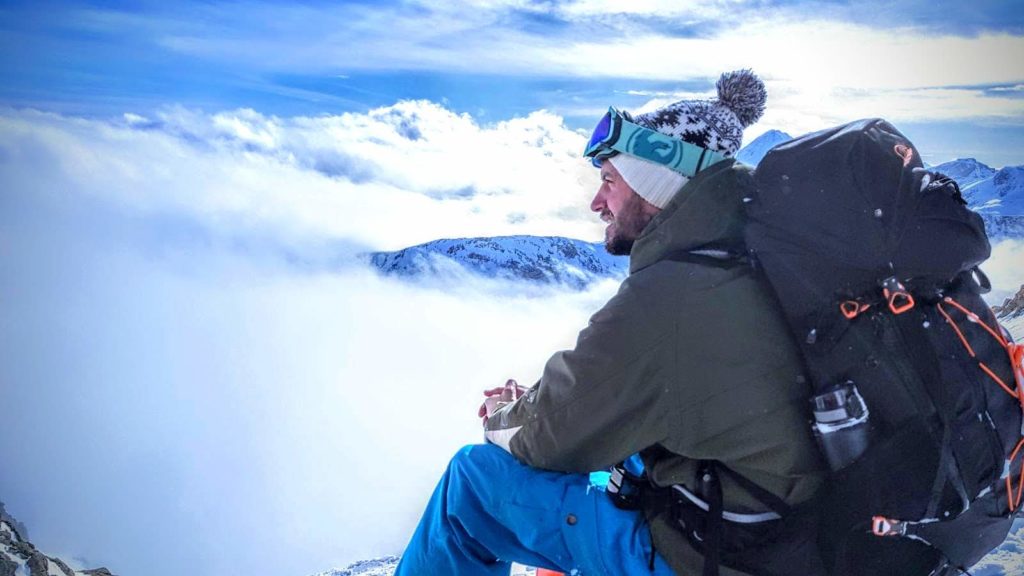
Having a break whilst doing some backcountry skiing in and around Monte Rosa in the Italian Alps
Felice Going away from the marathons now, what other sports do you do?
Rob So I’ve always been quite active and quite into my sports. I played a lot of football and rugby, and I got into endurance sports and did a lot of running. So a lot of long-distance running, marathon running. I’ve done a fair few triathlons, so I’ve done everything from a sprint triathlon right up to a full iron man distance triathlon. I love to play golf – I really enjoy my golf. I love tennis. I love open-water swimming – I’m doing a lot more of that probably than anything else at the moment. Yeah, I like to stay quite active.
Felice Where do you go to did open-water swimming?
Rob So I live in southwest London and there is a lake, about a 45-minute drive, called Shepperton and it’s beautiful. There’s a 750-meter loop that you can go and swim out there. And I’m a massive fan of going down – in fact, I am booked in to go down there this evening, which I can’t wait because it’s a really hot day today. They’ve actually done a lot of work recently to make themselves Covid-ready, if you like, to change the set-up a little bit as to how you…now you need to book and there’s only a certain amount people that can come in at a time and it’s very well done. And I know a lot of the open-water swimming locations have put in a lot of work to be able to get those open and ready in this virus-filled time that we live in.
Peter So away from sport, what’s the day job?
Rob My day job is being a television presenter, which I’ve been doing for eight years now. I present documentaries on engineering and science and history. I do a lot stuff on Channel Five. I’ve done stuff for BBC and Discovery and Travel Channel and all sorts. I’m a freelance TV presenter.
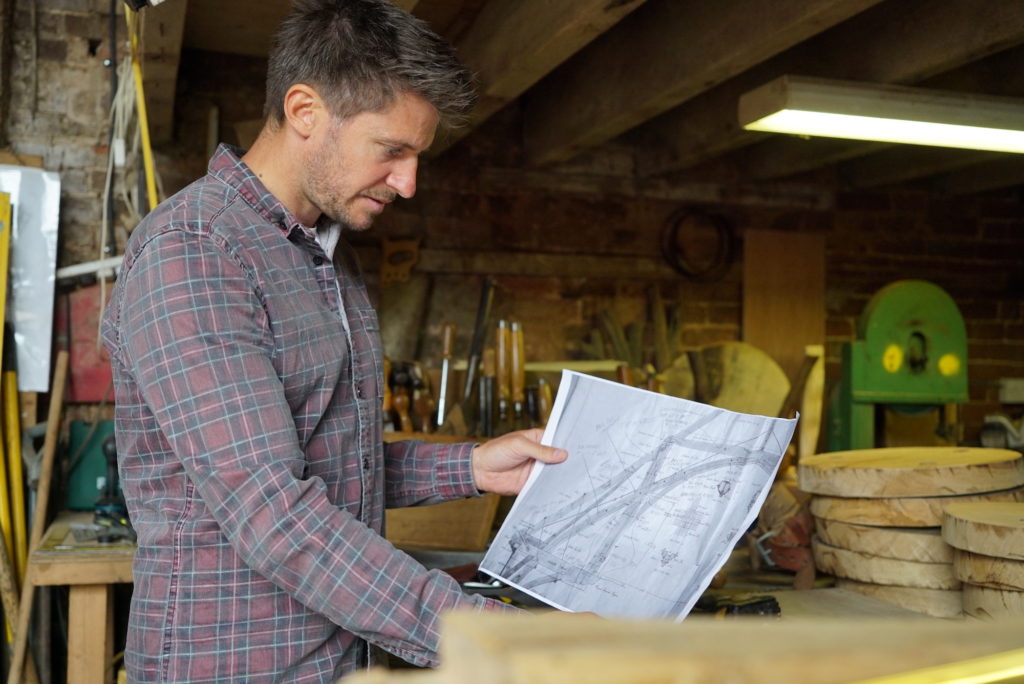
Rob looking at the design of the Hammer Beam roof of Westminster Hall for a TV series on the history of London
Peter So it sounds like a pretty complicated life, putting in the work, fitting in the sport – or the other way round.
Rob It can be – it tends to be fitting in sport around the work typically. But because I’m freelance, my work does tend to come in chunks. There won’t be much more time in my life for anything other than that project at that time. But if I’ve got races that I booked in, they will always…work will have to stop when I go and do those races. What becomes quite tricky is being able to do the training that I’d like to do leading up to those races if there is a lot of work on at that time, because I tend to be away from home a lot of the time if I’m on a work project. With with open-water swimming, that’s just not always the locations. I’ll always do my research before we go away though, to see if there are any rivers or lakes or reservoirs or anything that I can go and swim in while I’m away.
Peter So having done 777, which seems like the ultimate goal of all time, do you have another challenge in mind?
Rob I don’t think I have anything quite as big as seven marathons that I will ever do. That’s quite a difficult statement for me to say actually. I’m not 100% committed to it, but I’m probably at least 60% committed to that… just because that was such a big undertaking I don’t know how I could do anything bigger than that.
Something new I would like to do next year – it didn’t work out this year – is a long-distance ice-skating race, which I think would be really fun. It’s up in Sweden and there’s a bit of a challenge with it actually at the moment. In recent years, they’ve had to change its location and change the time of year they do it because of climate change – there just hasn’t been enough ice. So that kind of thing could be under massive threat. But I just really like the idea of going and doing something a bit different in that sense.
But from from a big challenge perspective, I’d quite like to do a long distance cross-country ski at some point as well. So it’s a slightly different intensity, I guess, of activity than running marathons. But if there are a group of mates who are up for something like that and planning a trip, a big old track on cross-country skis, I think I’ll be quite up for that.
Felice So you ski as well, don’t you?
Rob I do ski yes, I’m a big fan of skiing. I love skiing. I have been very lucky – I started skiing as a kid. I grew up in France and it was a little bit easier for us to get down and go skiing every year when I was growing up, which we did. My parents are quite active and my dad loves to go out on the mountain…both my mom and dad love being out in the mountains as well. So I was very lucky that I was exposed to quite a few different sports as a kid.
Felice So whereabouts in France did you grow up?
Rob I grew up just outside Paris for nine years. We moved there when I was nine. So it just feels like it’s a little bit easier to go skiing from within France than it is from England. Now that it’s going on my own ski trips over to France or Austria from England, it’s a bit more of a faff doing it than when you just pack up a car in France and it’s a six-hour drive and you’re down there. That just seemed a lot easier over there.
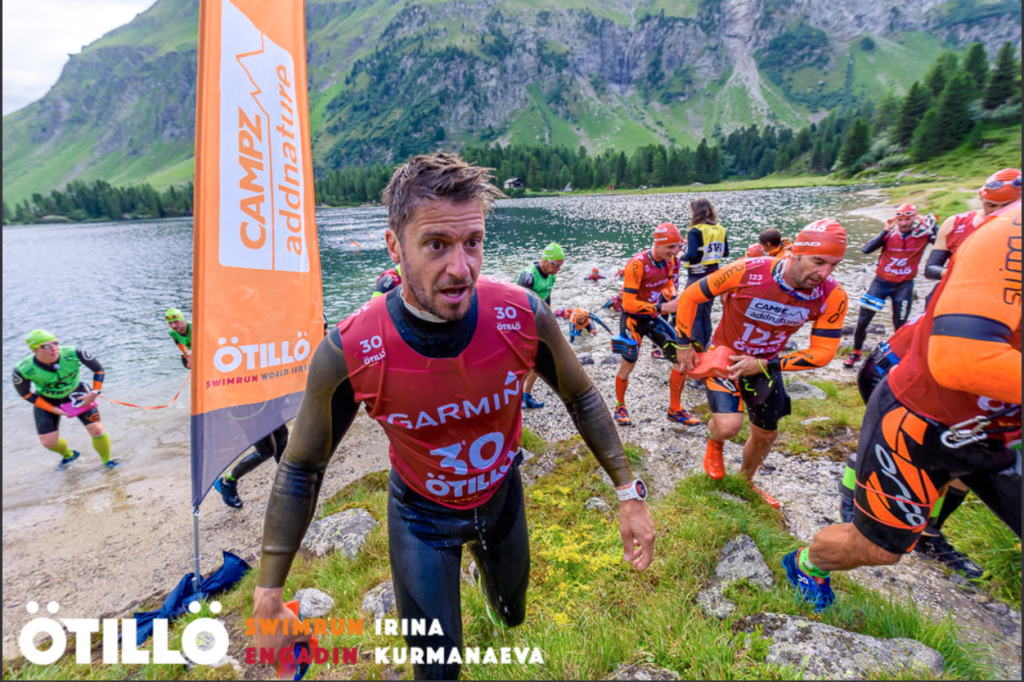
Exiting a lake swim as part of the Otillo SwimRun race in the Engadine, Switzerland
Felice Swim-run is a new thing for you?
Rob Yes, the swim-run’s a discipline that I hadn’t heard of until about five years ago, four or five years ago. The reason I first heard of it was because there was one race brand who I don’t know if they came up with swim-run, but they was certainly one of the first organisations to put it out there as as a new discipline, as a sport.
Peter Tell us what it is? What’s involved in the sport?
Rob Well, it is involved with swim, so swim-run does exactly what it says on the tin. You swim and you run, swim-run is where you do a series of swims and runs consecutively and you do it as a team of two. So the best example I can give is the first swim-run race that I did on the Isles of Scilly, where the race starts and you’ve got a 3km run and then you’re into the water and you swim across to the next island and then you run across that island, then you swim to the next one, and then swim. You run, swim, run, swim, run, swim. So you’re continuously in and out of the water.
That’s what I love about triathlon: you’re not just doing the same thing the whole time. It just feels like more of an adventure going in and out of the water the whole time. It feels more like you’re doing this race, but to get from A to B. I quite like that in it. And it takes you places in the world that you wouldn’t wouldn’t necessarily go to. And the fact that you get to do it as a team of two is really fun as well. You have to stay together the whole time.
A lot of people actually tether themselves together during the race. And you put your fastest swimmer out front and you get a little tiny bit of a tow, but because you’re tethered you’ll be right behind your teammate if you are the slowest swimmer, which means you just get this incredible amount of drafting in the water and it just makes it a lot easier for you. And then even on the run, you can put your stronger runner in front and you can just give the guy behind a little bit of a tow. So I just I love doing anything as a team; I miss my team sports, not playing rugby or football these days. So it’s really nice to combine endurance sports with that team element as well.
Felice Are there any sports you haven’t ever done that you’d like to try?
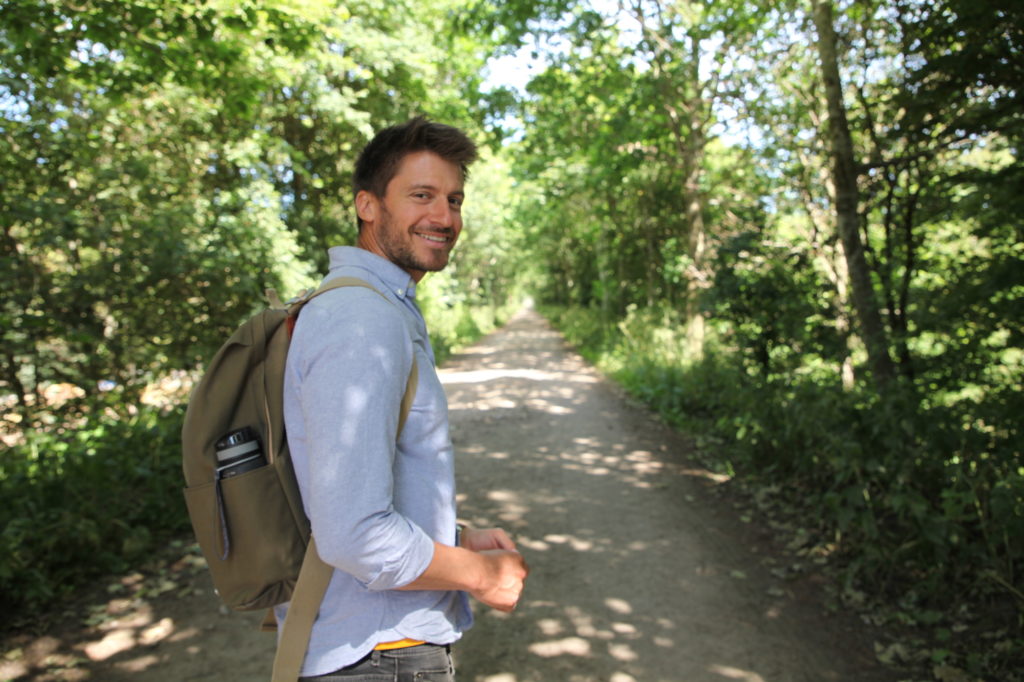
Rob Yeah, a couple of years ago I did like the idea of getting into kitesurfing. And when you’re on the water with a big kite on a board, it looked really fun. I’ve kind of lost the mojo for that at the moment, but it might come back. Something else that I thought that I would quite like to do and I still would, is get a license to be able to go paragliding. I’ve done a few paragliding flights, but with an instructor behind you. So you’re strapped in, you’re both on the same wing. But I’d like to be able to go and do that on my own. It’s such a beautiful, peaceful experience being up in the air and like to get a pilot’s license. But before we get to that, paragliding feels like a nice way to be able to fly. I’d love to be able to fly, I’m sure I’m not the only person. It’s kind of a dream to be able to go fly and experience and see the world from above. And paragliding is just always seems a really lovely way to go to do that.
I don’t think there are any other sports that I’d really longing to get into, but that might change – that’s the beauty. I can’t go and play a competitive game of football anymore. I just I feel like I’m going get injured doing that, and so I’ve accepted that. I loved that part of my life, it was amazing. And same with rugby, that was great. I still love both those sports. I’m a massive fan of rugby and I’ve gone into a lot of endurance sports, a marathon, and I’m kind of starting to have to accept that I possibly won’t do that as much anymore – that’s kind of been the last 10 years of my life. I might not do as much marathon running or do it as intensely as I have done previously. I enjoy the fact that there will be this kind of iteration.
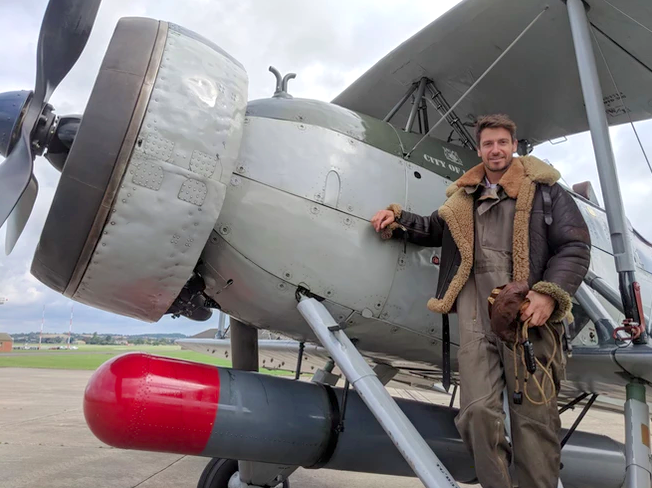
I’d quite like to start playing cricket actually, I’m a massive fan of cricket from the last 10, 15 years. I never played it as a kid. Occasionally with friends we will go down the nets and I just love it. I’ll go and watch Test matches and listen to a Test Match Special. If I can I’ll listen to five full days of Test Match Special, just have it on the whole time, I can’t get enough of it. So I’d quite like to get into cricket, even if it’s just village cricket. I love that team sport. And there’s a real excitement being at the crease and facing balls. I’m not good at it at all – I’d need to get a lot better before I actually went out and played properly.
Felice Are there any tips for people wanting to run marathons?
Rob Good question. My main tip would be if you’re going to go and run a marathon, you really need to want to do it, because that will mean that you will put the time and you put the training and it will mean something to you. Then if you if you can commit to that, I would really recommend finding a training plan. There are loads online, but wherever that training plan says, I would also say make sure you add variety into your training. Don’t just go out and hit the pavement three or four times a week, or however much it is.
Make sure you get some strength and conditioning work in which you can do at home or down the gym. Make sure you get some speed work in. I’ve got an athletics track which I can go down to, that has changed my running completely. My long-distance marathon running has been massively affected by the short interval training that I’ve been able to do on athletics tracks. And things like hill sprints as well – if you’ve got a hill near you try and do some sprints out that. So I would say change it up, make sure that you’re not just going out and doing long runs at the same speed the whole time. Vary your running – A it makes it more interesting. B, I’ve found it gives you a different challenge. And C, it’s just not as dull, which I find personally, just going out and hammering the pavement four or five times a week. I couldn’t do that. Oh…a final one: if you can get someone to do it with you then brilliant, then you can share that whole experience. That for me has been huge in everything that I’ve ever done.
Peter Rob Bell, many thanks for appearing on our travel podcast and we wish you the very best of luck in the future – on the road, in the water, up the mountain, or even on a village cricket ground.
Rob Thank you very much, guys. An absolute pleasure. I look forward to hearing more inspiring stories from some of your future guests. As much as I can I try and document whatever I’m up to on my Instagram account, which is Rob.Bell. That’s the place to go if you want to see what I’m up to – be it training or be it doing woodwork in my back garden or be it out filming in the highlands of Scotland about some tarn somewhere. That’s where my life tends to be.
Felice That’s all for now. If you’ve enjoyed the show, please share this episode with at least one other person! Do also subscribe on Spotify, i-Tunes, Stitcher, or any of the many podcast providers – where you can give us a rating. You can also find us on Instagram, Facebook and Twitter. Stay safe and we’ll see you next week.
© ActionPacked Travel

- Join over a hundred thousand podcasters already using Buzzsprout to get their message out to the world.
- Following the link lets Buzzsprout know we sent you, gets you a $20 Amazon gift card if you sign up for a paid plan, and helps support our show.
